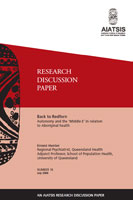Back to Redfern: Autonomy and the 'Middle E' in relation to Aboriginal Health
ABC’s flagship current affairs program PM for 21 June 2006, juxtaposed three Indigenous items. The first recorded the launch in Canberra of Australia’s Health 2006 by the Commonwealth government minister of health, Tony Abbott, in which he called for a new form of paternalism (“a paternalism based on competence rather than race”) to address unrelenting Indigenous health problems associated with failed past policies including ‘self determination’. The item also included the immediate reactions of Indigenous spokespersons who, in noting that self-determination had never been realised in practice, objected strenuously to further erosions of autonomy. The second item presented evidence of adults exchanging petrol for sex with children and young people, and the impunity of perpetrators, in Central Australian Aboriginal communities. Perhaps to mitigate the sombre tone of these two stories, the third item recounted the successes of the Aboriginal Employment Strategy in providing real employment opportunities for Aboriginal residents of Moree. Paternalism, autonomy, vulnerability, opportunity – these terms are ambiguous and contentious in relation to Indigenous affairs. While the terms are malleable to political purposes the concepts involved are critical in terms of Indigenous health and all relate to the fundamental issue of ‘control of destiny’.
This discussion paper is based on the Redfern Oration to doctors of the Australasian Faculty of Public Health Medicine (Cairns, 9 May 2006). In it I frame discussion of these and related concepts by challenging medical practitioners to consider what striving for a just society means in relation to Aboriginal and Torres Strait Islander health. Conventional conceptions of medical ethics fail to resolve competing values and responsibilities at the clinical coal-face, and I draw on the concept of ‘fair equality of opportunity’, which emphasises the critical importance of education and health as social determinants and social rights. I highlight the importance of child development and use Indigenous suicide to exemplify the impact of disrupting the neuro-psycho-social developmental milieu, and the consequences of this across generations. Suicide also illustrates the problems associated with the medicalisation of complex social issues and the narrow conceptualisation of ‘risk’. For medical practitioners, the particular vulnerabilities of Aboriginal children raise challenging ethical questions, both in terms of prioritising social goals over patient needs, and in regard to paternalistic interventionism. This is, of course, a critical issue for a profession in which paternalism is inevitable. In this regard, I consider the difference between paternalism that supports autonomy and paternalism that undermines autonomy, particularly as it relates to the critical issue of real ‘control of destiny’.
